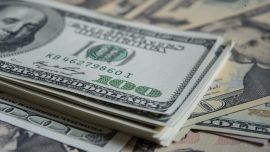Paying with cash is becoming increasingly cumbersome in Argentina, with huge piles needed as the government refuses to issue bills with larger denominations despite inflation galloping toward 100 percent.
In scenes reminiscent of Venezuela, the Argentine peso’s sharp decline in parallel markets is multiplying the bills needed for everyday purchases in a country where the largest bill is worth less than US$4. A gap between Argentina’s official exchange rate and a variety of parallel exchange rates encourages tourists and locals who have greenbacks to trade money in cash on the black market.
The problem stems from the fact that the largest denomination bill in Argentina is 1,000 pesos. At the official rate, that’s worth US$6.43, but due to strict capital controls, Argentines and foreign tourists often exchange dollars at the commonly used black market rate known as “dolár blue,” where 1,000 pesos fetches just US$3.44. The Central Bank told Bloomberg News it’s focusing on digital payment systems instead of promoting cash use.
Oscar Salem and nine friends left a mound of cash to pay their restaurant tab at a Buenos Aires steakhouse, including various cuts of grass-fed meat, top-shelf wine and desserts.
The final bill: US$50 per person on average, according to a viral photo Salem posted on Twitter on Saturday while visiting Argentina’s capital. Most foreigners who turn to the black market for pesos benefit from enjoying tourists attractions at a fraction of the price that they would pay in other countries.
“There’s no reason for any tourists to pay with a credit card, it’s literally 50 percent more,” Salem, founder of consulting firm BCM Partners in Montclair, New Jersey, told Bloomberg. Paying in cash is a “no brainer. In New York City, this meal is US$3,000.”
To be sure, electronic payment options – such as mobile points of sales, QR codes and direct bank transfers – have jumped in popularity for Argentines since the pandemic, with 53 percent growth of transfer payments in August from the prior year. But that growth doesn’t extend to tourists or locals who exchange cash dollars to protect their savings from currency devaluation.
A Central Bank regulation that sought to encourage tourists to bring funds into the country through official channels has not yet been implemented.
Eroded value
In a written response to a question on the possibility of incorporating bills of larger denominations, Central Bank Governor Miguel Pesce pointed to a figure that 98 percent of Argentine adults have a bank account. (World Bank data shows that figure at 71 percent)
“The key is in the development of electronic payment systems,” Pesce said in a statement. “The Central Bank promotes digital payment methods like debit, credit, automatic transfers, electronic checks, bank wallets and non-bank wallets.”
In the meantime, the declining purchasing power of the peso continues to draw jest from foreign tourists. Eduardo Bolsonaro, son of Brazilian President Jair Bolsonaro, is among foreigners whose social media post was widely shared after he showed how he paid with a huge pile of cash at a restaurant.
In July, Brazilian football fans tore up pesos at a game to mock their Argentine counterparts. And a Dutch traveller with a quarter million TikTok followers posted a video laughing in his Buenos Aires hotel room with 1,000 bills raining down.
by Patrick Gillespie, Bloomberg





















Comments